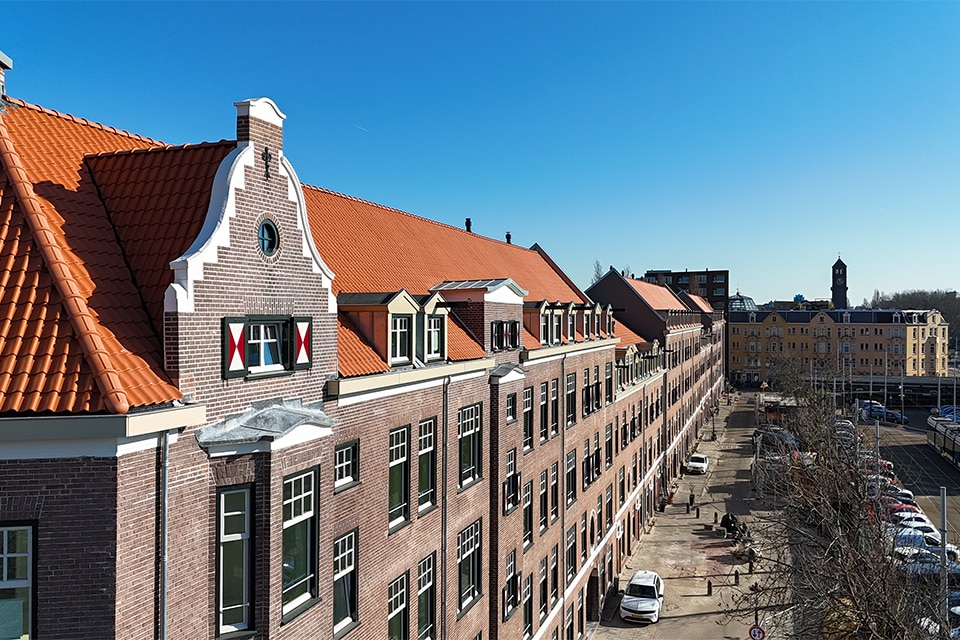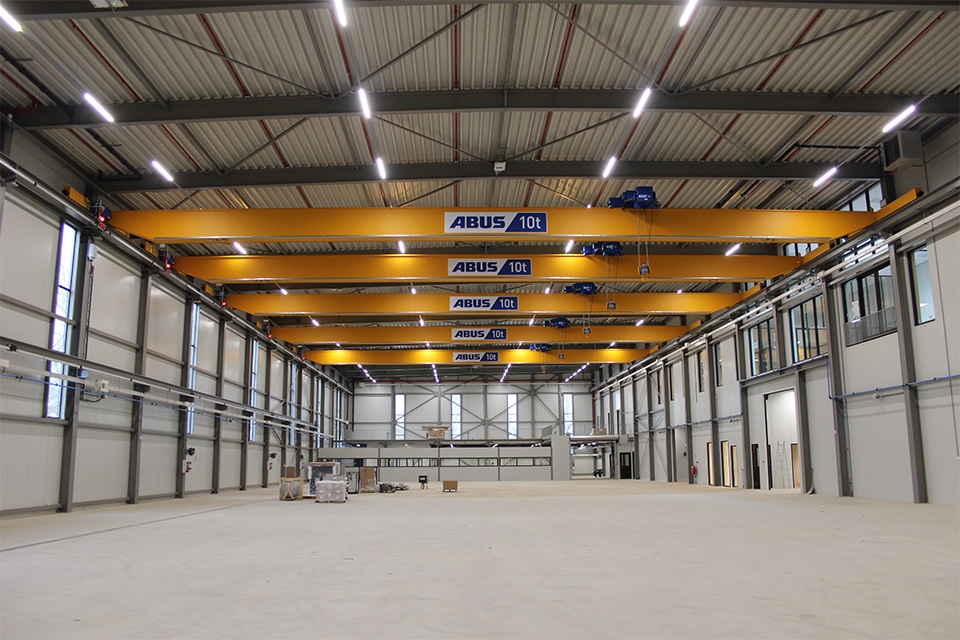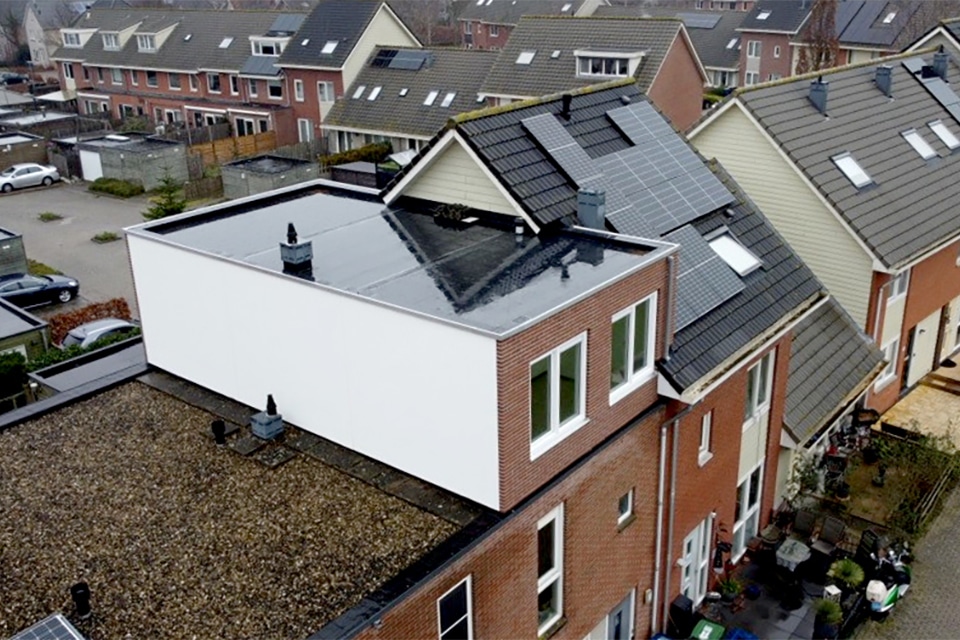
Circular apartments for students
Building student housing at a rapid pace
The Leerpark in Dordrecht is an innovative city district in the making: a 'Weconomy' that encourages collaborations. It is a meeting place of people: cooperatives, education and small communities. In terms of education, you will find a wide range of courses: from secondary schools and vocational training to higher education. Daiwa House Modular Europe is building apartments for students here in cooperation with the municipality of Dordrecht.

"We are creating 285 one-bedroom apartments and 48 two-bedroom apartments in two buildings here," says project manager Kris Kok of Daiwa House Modular Europe. "The one-bedroom apartments will be six by three meters and the two-bedroom apartments are twice that size. A small portion of these are intended for emergency seekers or people who are going into assisted living. In any case, they are all intended for temporary occupancy." All apartments have their own kitchen, private bathroom and internet connection. So each one is full-fledged housing.

Fast modular construction
Because the housing shortage is also acute in Dordrecht, it was the wish of the municipality to be able to deliver as soon as possible, preferably this year. Daiwa House Modular Europe is building the apartments in a modular way. In week 28 the piling work was started and in week 35 the installation of the modules. Industrialized construction of the modules started well before that, Kok says. "We completely completed the modules in our own factory in Montfoort before the start of construction. That goes at a rate of seven modules per day, so 35 units per week. We then pack them wind and watertight until delivery. On the building site, they can then be stacked directly on top of each other and connected. We apply the exterior wooden cladding on site."
So because the contractor had been building for quite some time, the material problems were not too bad. Says Kok, "We had already purchased a lot before the start of the Ukraine crisis. But price increases and material shortages are now standard good in the construction world. We have the advantage of purchasing a lot at once, although sometimes that is also a bit of a fit and finish for the purchasing department."

Circular construction
In addition to shorter construction time, modular construction also provides sustainability benefits. Should the buildings no longer be needed in fifteen years, 90% of the modules can be reused. Kok: "The nave size of three by six meters is a standard and fully engineered product with us. This means that it easily meets the living requirements of today's residents and can also be used in the future. In addition, the homes are gas-free and are heated via an electric radiator. In addition, they are very well insulated and ventilated."
For this project, parties also hooked up through the MIA/Vamil tax scheme. This scheme encourages the creation of a circular material chain by realizing circular buildings with residential function. "Sustainability is reflected in every aspect. For example, the roof is fitted with solar panels, the balancing of which goes back to the students, giving them a lower energy bill. In addition, the MIA/Vamil has further encouraged us to use new, sustainable products and materials. The challenge here is the requirement that products and materials have a Life Cycle Assessment (LCA) in the National Environmental Database. That makes the actual sustainability and circularity of products and materials transparent."

Optimal living comfort in noise-sensitive location
Mview+ is a specialist in unique glass solutions for optimal living and working comfort. The new student units at the Leerpark in Dordrecht are sandwiched between a railroad line and the N3, which causes the necessary noise pollution. Director Waldo Duin of Mview+: "As soon as people start living in noise-sensitive areas, measures often have to be taken."
Mview+ was asked to provide a suitable solution. The company supplies some 150 innovative and durable Silent Air Facade Screens. These are mounted in front of the rotating parts of the window frames and have a sound-absorbing edge. This keeps - even when the window is open - the noise value well below the limit value.
Duin: "This project involves student units with a one-sided facade. The Silent Air Façade Screen was the ideal solution here: it blocks out over 10 dB of noise while still leaving enough room for spray ventilation. Because it is a new construction project, the details could be better connected, in consultation with architect and client." A few units have already been installed, with the rest to follow in early October. "The screens are already in place, so we expect to be ready in two to three weeks. The big advantage of this contractor's projects is that they work a lot with prefabricated elements, which fits well with our product. So we work together on a regular basis."
Tailored profile for Leerpark
This year, the Leerpark in Dordrecht will gain 333 new homes for starters and students. The homes will be built by Jan Snel/Daiwa House Modular Europe. Wiggers is contributing as an inventive specialist in prefabricated joinery solutions.
"We supply window sills, interior frames and baseboards, as well as wooden ceiling frames, among other things. For this project we supply the baseboards and also the paneling for windows and doors," says director Gerrit Hartman. The parts were delivered as prefabricated packages at Jan Snel's workshop in Montfoort. "Making the parts has to be relatively quick. In addition, flexibility in terms of dimensions is necessary. That is our strength, Jan Snel says how they want it and we make it. In this way we have a very fine cooperation."
For the homes, Wiggers uses products from the EcoProfiel range. The profiles are ready-made, sustainable products for construction. "They are specified per room, so the fitters can quickly install them on the inside of the window frames. The top coat, which is scratch-resistant and UV-resistant, eliminates the need for paint." In the student complex, Wiggers also provided the finishes for the coupling seams if two units are mounted together. This creates homes of 18 and 24 square meters.
Early table, safe generation
With at least 6,000 units completed, student housing is a specialty of Van den Pol Elektrotechniek. These are often projects with Daiwa House Modular Europe, for large-scale complexes such as Campus 030 and Elzenhagen (Amsterdam). Van den Pol also works with construction companies such as VORM 2050. A current example is the 921 student houses of High Five, on the Utrecht Science Park.
Text | Van den Pol Elektrotechniek
The sooner, the better
In the case of Leerpark's 333 new units, Van den Pol was at the table early in the preliminary process. "The sooner, the better," states project manager Sebas L'Ortye. "In such a construction team approach, there is a lot of room for our expertise. Direct contact with the user also contributes to an optimal end result."
Reduced consumption through smart sensors
After engineering, the installations are prepared at Daiwa's production site. At the construction site, Van den Pol provides the coupling and cabling. "Furthermore, we realize the electrical facilities, data installation and lighting. The energy-efficient LED lighting in the general areas is equipped with smart sensors. Lights are on 10% and switch to their full strength when motion is detected. That makes a significant difference in energy consumption."
Scarce roof space
Energy is not only saved in Leerpark, but with 132 solar panels, it is also generated itself. "In many projects we install such a solar power facility," says L'Ortye. Roof space can be an issue. "More and more heat pumps are being used. For the associated outdoor units, the roof is a logical place. This leaves less space for solar panels."
SCIOS scope 12
Safety of PV installations is getting more and more attention. "One of the aspects is the roof insulation used. We adapt the installation accordingly." To ensure safety, insurers often require a SCIOS scope 12 inspection. "All our PV installations are delivered in accordance with this guideline. If required, EVI Montfoort, Van den Pol's independent inspection branch, performs such a scope 12 inspection. Customers are then assured that they are generating green power safely."
- Client Municipality of Dordrecht in cooperation with Leerpark 2F
- Architect Rose Ros
- Main contractor Daiwa House Modular Europe
- Subcontractors Kleywegen, Eskra Construction, Mview+




